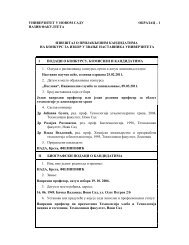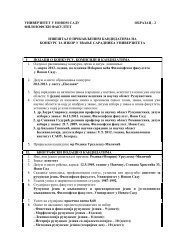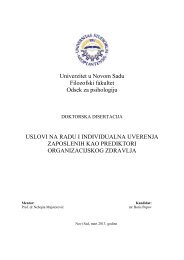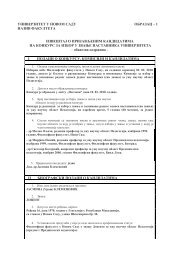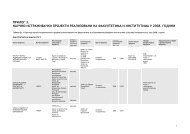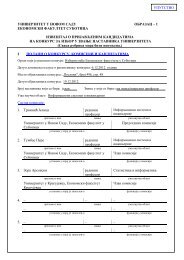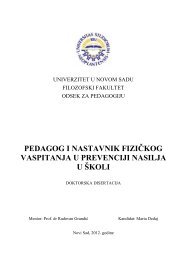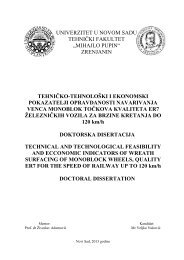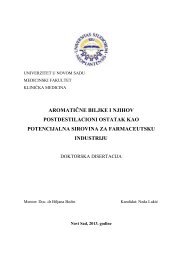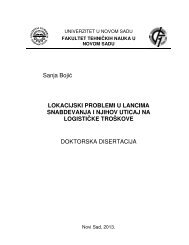Intercultural competence as an aspect of the communicative ...
Intercultural competence as an aspect of the communicative ...
Intercultural competence as an aspect of the communicative ...
Create successful ePaper yourself
Turn your PDF publications into a flip-book with our unique Google optimized e-Paper software.
contact with o<strong>the</strong>r nations we are big nationalists […] but not among ourselves’ (I2). This<br />
is <strong>an</strong> interesting view, since it is only in relation to o<strong>the</strong>rs that one nation c<strong>an</strong> show this<br />
‘attitude’. In m<strong>an</strong>y inst<strong>an</strong>ces <strong>the</strong> interviewees w<strong>an</strong>ted to stress <strong>the</strong>ir appreciation <strong>of</strong><br />
equality <strong>of</strong> cultures, <strong>the</strong>y w<strong>an</strong>ted to show respect <strong>an</strong>d underst<strong>an</strong>ding towards cultural<br />
practices. However, while trying to be objective <strong>an</strong>d politically correct, <strong>the</strong>y did<br />
interpolate remarks that pointed to <strong>the</strong>ir preferences <strong>an</strong>d actual opinions. For example<br />
‘We are <strong>of</strong> a friendly disposition, more th<strong>an</strong> some western countries’ (I4). This might<br />
show that <strong>the</strong> students were in <strong>the</strong> Defense stage, where <strong>the</strong>y experienced <strong>the</strong>ir own<br />
culture ‘<strong>as</strong> <strong>the</strong> only viable one – <strong>the</strong> most “evolved”’ (Bennett 2004: 65). The individuals<br />
at <strong>the</strong> Defense stage are more adept at noting difference, but <strong>the</strong>ir worldview is not<br />
complex enough to account for equally ‘hum<strong>an</strong>’ (Bennett 2004) experience <strong>of</strong> o<strong>the</strong>rs,<br />
which might be detrimental for individuals’ fur<strong>the</strong>r learning <strong>an</strong>d might aggravate future<br />
IC contacts.<br />
In a related question <strong>the</strong> interviewees were <strong>as</strong>ked to state whe<strong>the</strong>r <strong>the</strong>ir views <strong>of</strong><br />
what constitutes a typical Serb are shared by <strong>the</strong>ir peers. The question aimed at showing<br />
whe<strong>the</strong>r <strong>the</strong> interviewees perceived <strong>the</strong>mselves <strong>as</strong> typical representatives <strong>of</strong> <strong>the</strong>ir culture,<br />
or whe<strong>the</strong>r <strong>the</strong>y saw different representations <strong>of</strong> <strong>the</strong>ir culture. Most <strong>of</strong> <strong>the</strong>m claimed <strong>the</strong>y<br />
did not know <strong>the</strong> attitudes <strong>of</strong> <strong>the</strong>ir peers but still m<strong>an</strong>aged to provide <strong>an</strong> <strong>an</strong>swer, usually<br />
dist<strong>an</strong>cing <strong>the</strong>mselves from <strong>the</strong> peers who were ‘radical’ or ‘nationalistic’ (I1, I8, I9 <strong>an</strong>d<br />
I10), ‘like we are some heavenly people’ (I4), ‘more extreme’ (I3). The <strong>an</strong>swers showed<br />
that <strong>the</strong> interviewees did not see <strong>the</strong>mselves <strong>as</strong> typical representatives <strong>of</strong> <strong>the</strong>ir people<br />
(There are m<strong>an</strong>y groups, like Obraz, or something like that, <strong>an</strong>d that is all wrong (I3), I<br />
wouldn’t say I’m a typical, stereotypical Serb (I9), [<strong>the</strong> peers] share my opinion on<br />
culture, but <strong>the</strong>y don’t show it enough (I2)). One interviewee stated that her peers are not<br />
patriotic enough, unlike her (I2), while <strong>an</strong>o<strong>the</strong>r stated that her peers idealized o<strong>the</strong>r<br />
nation, but not <strong>the</strong> people, mentioning America <strong>as</strong> <strong>an</strong> example.<br />
While this might be <strong>an</strong> attempt to present oneself <strong>as</strong> different, or to provide<br />
socially acceptable <strong>an</strong>swers, what might support <strong>the</strong> <strong>an</strong>swers is <strong>the</strong> ‘incident’ that<br />
happened during this study. Some students <strong>of</strong> <strong>the</strong> History department declined doing <strong>the</strong><br />
questionnaire because it w<strong>as</strong> typed in <strong>the</strong> Latin <strong>an</strong>d not Cyrillic alphabet. They also<br />
declined participating in interviews, when hearing that <strong>the</strong>y were about learning English<br />
among o<strong>the</strong>r things.<br />
The import<strong>an</strong>ce <strong>of</strong> <strong>the</strong>se findings is seen when compared to <strong>the</strong> results <strong>of</strong> <strong>the</strong> GPI,<br />
which showed that <strong>the</strong> whole sample had a high me<strong>an</strong> score for Identity, 3.9 for<br />
205



